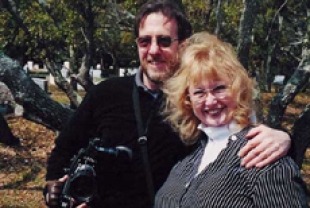Documentary filmmaker Ross McElwee has been looking at his life since the 1970s with Charleen, which is about his high school teacher, Backyard, about his doctor father and surgeon brother, and Sherman's March: A Meditation on the Possibility of Romantic Love in the South During an Era of Nuclear Weapons Proliferation, about the Civil War general and portraits of seven southern women. In his new rambling, idiosyncratic, and witty documentary, McElwee returns to his birthplace in North Carolina, which he describes as "the most beautiful place to me."
He learns that his great-grandfather, who created the famous brand of tobacco called "Bull Durham," might be the character portrayed by Gary Cooper in the film Bright Leaf directed by Michael Curtiz. This sets McElwee's imagination spinning, and he decides to take a hard look at his family legacy. He visits the house where he was born and then is reminded by a teacher friend that the Duke mansion, owned by the millionaire who defeated his great-grandfather in a series of lawsuits over Bull Durham rights, is only a block away. The woman compares that 52-room mansion with McElwee's home by calling the latter "Buck Duke's outhouse."
The filmmaker decides to check out the tobacco culture of North Carolina. He talks with several farmers who have been growing this crop for generations. One, an ardent Christian, doesn't see any problems with what he does, although his minister has mixed feelings about tobacco. A woman farmer says of tobacco, "It has nothing to do with anybody who dies."
McElwee visits with a woman dying of cancer brought on by her smoking, interviews some people who have quit smoking, and then does an interesting multipart look at some friends who lament their addiction to cigarettes, make a vow to stop, and then struggle and fail to fulfill their promises. For many people, one allure of smoking is that it creates an exotic trance state where time seems to stop. McElwee wonders whether he has been seeking the same thing in his documentaries.
Throughout this work, he includes scenes about his young son. There are also bits about his father and brother, doctors who treat those suffering from the after-effects of cancer. Perhaps they are the antidote to the terrible demons set in motion by his great-grandfather's tobacco business. Of course, McElwee's exploration of addiction and suffering, money-making and a product that kills is courageous in itself.
Although the filmmaker comes across a very sincere person, he also is blessed with a very fine sense of humor. This is revealed in a small segment in the documentary where he does an interview with a film historian to see what he thought of Bright Leaf. Instead Vlada Petric gives him a lesson in kinesthetic cinema that is a hoot from start to finish! The comparisons McElwee makes with the small park dedicated to his great-grandfather (who eventually lost all his money) and the shrines built in honor of his competitor at Duke University are quite whimsical as well. Bright Leaves is a smart, ethically rich, innovative, and well-done documentary about the tobacco industry, family legacies and the pleasures of filmmaking.
The DVD's extras include a director's statement, film notes by Godfrey Cheshire, biographies, music tracks, and more.
Screened at the 41st New York Film Festival, October 2003.
